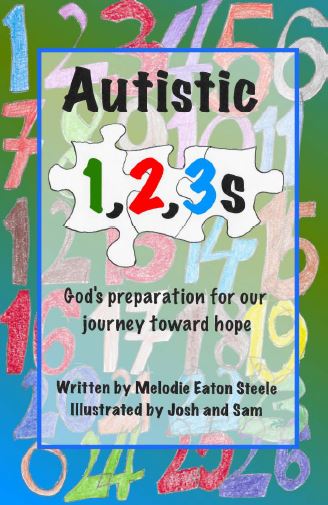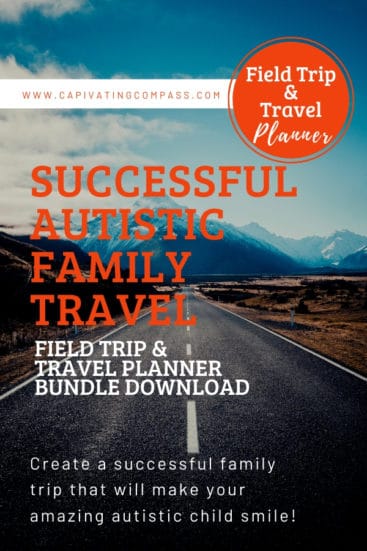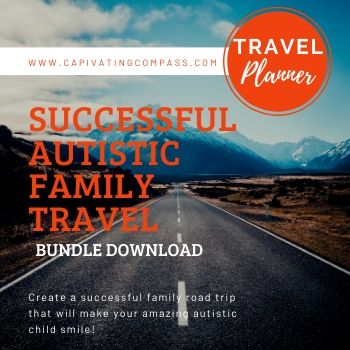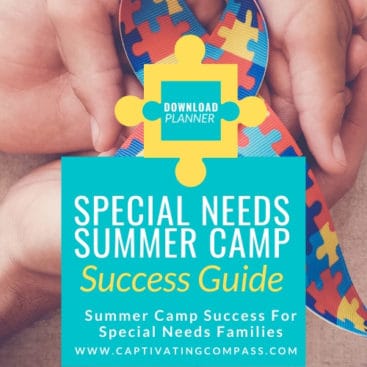
Summer camp these days looks nothing like any of us planned, so while this post may seem out of sync with the current activities of this summer, it is bursting with resources and information that can be applied to many new situations and camp-style events for special needs families (virtual or with friends & family). Above all, use these resources to think outside the box when it comes to how to help your special needs child enjoy and thrive in new situations.
Summer Camp Success Tips For Your Special Needs Kids.
A collaborative post by Melodie Eaton Steele & CaptivatingCompass.com
Are you considering summer camp for your homeschooled child with special needs? There are so many great summer camp options. Finding the right summer camp for your special needs kid takes planning, but it is well worth it for parents and children alike. We are going to break down the idea of summer camp for special needs kids and provide you with the success tools you need to create peace of mind and confidence for you and your family.
Overall, there are some amazing benefits of camp. For special needs kids, summer camp success looks like this:
- confidence boosts.
- independence is explored and increased
- physical activity is an accessible environment
- build lasting friendships
- interacting with positive role models
- a chance for parents to get a break and participate in self-care
- new situations provide an opportunity to improve problem-solving and communication skills
Types of Summer Camps for Special Needs Kids
Special Needs Camp
Special needs camps are those that are specifically designed with special needs kids in mind. Whether your child has diabetes, autism, ADHD, or other medical or developmental concerns, there is a camp out there to meet your family right where they are at. Special Needs camps provide a fun, safe, and encouraging camp setting to explore and learn new things.
As a homeschool family, there are pros & cons to weigh.
Pros
- Your kids will get to hang out with others with the same or similar challenges.
- The environment will be geared toward the needs of a specific disability.
- There will be opportunities for families living with similar circumstances to network
- Activities will be appropriate and well thought out to accommodate the needs of a specific disability.
Cons
- Depending on where you live, you might have to travel long distances.
- Specialized camps can be more expensive than mainstream camps
- Accommodation may be difficult based on the camp’s setup.
“We have found a special needs camp to be one place where our kids can just be themselves. They’re not trying to fit into a world that doesn’t understand them. We don’t have to shush and corral and explain why they’re doing or saying odd things.” Melodie Steel, Author Autistic ABC’s & 123’s
Camp Attitude in Oregon and Joni & Friends Family Retreats are great examples of special needs camps that can include the whole family.
Mainstream Camp in the Local Community
This type of camp can be everything from Vacation Bible School to science or drama camp. Activities, hobbies, and a variety of different skills can be introduced or provide the opportunity to improve skills and just have fun. This type of camp for special needs kids can often be easier and cheaper, but there may be challenges. You will need to consider if the safety, preparedness, and atmosphere are going to be a positive experience for your child. Understanding and weighing the pros & cons will be helpful in making your decision. Here are a few things to consider:
Pros
- Like more affordable
- Opportunity to engage & get to know families in the local community
- Can attend with siblings
- Close to home
- Interaction with ‘neurotypical’ peers is a relaxed setting.
Cons
- some activities may not be appropriate for your child
- lack of safety precautions for special needs kids
- peer situations may be stressful or dangerous
Camp Mom (or Grandma/Grandpa/Auntie, etc.)
As homeschool families go, DIY Camp can be a lifesaver. You know your kids and their needs. It’s an opportunity to spend quality time together in a unique setting. Take the opportunity to tailor-make an experience that will accommodate your child’s needs. Include a few of their friends and have fun together at a pace your special needs child can find enjoyment and success. Of course, there are pros & cons to this type of cam as well. Here is what to keep in mind.
Pros
- One-on-one time
- Tailor-made enrichment for your special needs child
- No worries about untrained counselors
- Opportunity to try different teaching styles/techniques or subjects ina relaxed environment.
Cons
- No self-care break for parents/family members
- Limited peer interaction for the kids
- The added expense for supplies
- Activity planning logistics can be overwhelming
Things to consider, no matter what type of camp you choose
I’ve asked Melodie, author of Autistic ABCs: A family’s reflection on the journey toward hope, to share with us a few of the Autistic ABCs that come into play when she makes summer camp for her autistic family. Read more about Melodie and her journey toward hope.
C
Categories
How quickly we like to put people into categories. People with autism are inflexible. People with Asperger’s are studious. People with Down syndrome are happy. These people all have names, viewpoints, and unique attributes. My children have the same diagnosis of autism. They share similarities, yet they are very different. They are individuals.
Push/don’t push?
It’s tricky to push enough so that your child can learn something new but not so much that they meltdown and feel like a failure. Try to anticipate their reaction. If I know my child does not care for animals, horseback riding might not be the first choice. But you never know. This is where special needs camp can be so helpful. The staff and counselors and other families with special needs have seen MANY meltdowns and aren’t bothered if your children scream or throw tantrums when they encounter something they can’t handle. Also know that IT’S OK, whatever happens. Our kids’ time at camp is likely to look different than what we experienced as kids. Our kiddos do not have our expectations, so their own unique experience will be rewarding to them.
Preparing kids for special needs Summer Camp
Melodie, author of Autistic ABCs & 1,2,3’s, offers these great tips and excerpts from her book.
Social Stories
A social story is helpful to prepare for any new experience. It does not have to be elaborate. A checklist or a time schedule also works well. Some kids like to have a pocket schedule. When they get anxious, we remind them, “Check your schedule.” It can have words, picture icons, or both. Number the days if your child responds to numbers. Get a feel for how much info is necessary for each kiddo.
Sample Social Story:
Tomorrow we will go to camp.
We will sleep in a tent/cabin/yurt.
We will sleep in sleeping bags.
We can choose special activities: fishing/hiking/swimming.
We can enjoy a campfire and make s’mores.
We can choose to bring [special item] with us.
Sometimes the kids get anxious about being away from home. When they exhibit anxiety, we reiterate the schedule: “Today is Tuesday. We will go to the lake. Tomorrow is Wednesday. We will go on a hike. On Friday, we will eat breakfast, pack up, and drive home.”
If you need help creating social stories that will work for your family, consider this resource.
Keep the mood positive but honest
Melodie says, “I don’t like to make promises I cannot guarantee. Try to state facts. Instead of saying, ‘You’re going to LOVE camp!’ I say, ‘Camp is a place where we can hike/sleep in a tent/enjoy a campfire and make s’mores.’ “
We have found a special needs camp to be one place where our kids can just be themselves. They’re not trying to fit into a world that doesn’t understand them. We don’t have to shush and corral and explain why they’re doing or saying odd things.
Here’s an Excerpt from Autistic 1,2,3s:
Camaraderie
Parents of special needs children have a common appearance–a very glazed over, worn out, “where-am-I?” look. At the parents’ meetings, we all just sit there with blank, exhausted stares. We’re completely overwhelmed. It is comforting, however, to be with people who understand and don’t need an explanation as to why our kids do what they do. When one of our children escapes from the babysitters and comes running into the meeting, we all just smile.
Pain
Josh is a sensory seeker. He could walk for miles in shoes that were on the wrong feet and never complain. He used to pick up honey bees off of the flowers in the garden. At summer camp we went fishing and I couldn’t find the fish hook. It was in his thumb. Thank goodness he is the one with diabetes and not Sam. Sam is a sensory avoider.
Prompts
Verbal, audio, pictorial, written, numeric, and gesticular prompts are necessary for our kids to follow through on simple tasks. They might need a written schedule with numbered steps and images while we verbalize instructions and physically demonstrate how to hang up clothes or wash their hands. The goal is to keep reducing the number of prompts and let muscle memory take over. Until that day comes we have to follow them into the bathroom, stand next to them at the sink, mime handwashing, and talk them through the steps. If we don’t do this, they get stuck and just stand there, hands dripping, not knowing what to do next. It’s vital that Josh get his hands clean because unthoroughly washed hands can skew a blood sugar reading.
~Medolie Steele, Autistic 1,2,3s
Model Positive Flexibility & Stick To The Script
Refocus a homesick child on the schedule and on the positive.
When our child says, “I want to go home.” I say, “We will go home on Friday.” Try not to state the negative. I don’t say, “You can’t go home yet.” Stay positive. Refer back to the schedule.
Having a schedule where they can cross off the days/activities is also helpful.
Everything you can express in many formats helps: verbal, pictorial, and written. Stick to the script.
“On Friday, we will eat breakfast, pack up and drive home.” After a few times of repeating this info, let them fill in the blanks: “On ____________ we will ______________, pack up and drive _______.” This lets them verbalize the schedule and ease stress.
If the schedule is beyond your control, you can say “can do” instead of “will do.” I also remind them we can be super flexible on the schedule!
Get your Special Needs Summer Camp Success Planner Now!
There is so much to consider. And, if you are just starting to explore the idea of summer camp for your special needs child, you might feel a wave of overwhelm that feels like a tsunami. To help you focus, plan, and consider all your options, you will want the Special Needs Summer Camp Success Planner.
The Special Needs Summer Camp Success Planner includes:
- Pro/Con Question sheets to help you decide on the best type of camp
- Interview Questions to help you narrow down your selection
- Checklist of things to pack
- Social Stories examples
- Tips on how to interact with others at your special needs camp








